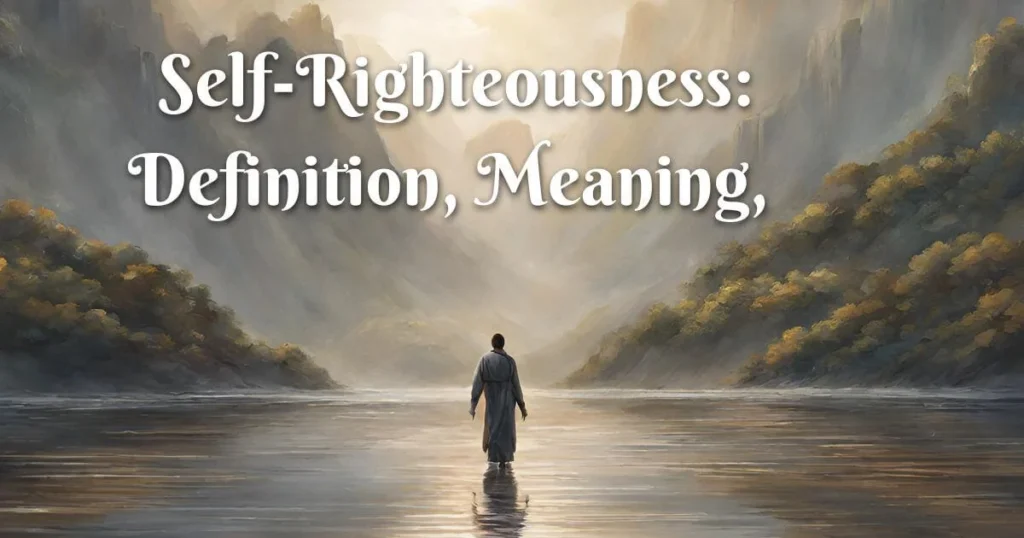
Self Righteous Definition, Meaning, and Types :
The word “self righteous” is a complicated concept with many connotations within the complex terrain of human behavior. It’s a characteristic that shows up in a variety of settings, from intimate partnerships to more general society dynamics. This thorough guide seeks to analyze the idea of self righteous by defining it, explaining what it means, and examining the various forms that might appear in people.
What Does Self Righteous Mean
Self Righteous Definition:
A confidence in one’s own righteousness or truth can lead to feelings of moral superiority or smugness, which is known as self righteous. It is typified by an unyielding assumption that one’s opinions, deeds, or convictions are intrinsically better or more morally upright than those of others. Self righteous people frequently believe they are better, more morally justifiable, or virtuous than those around them.
This attribute is not specific to any one ideology, religion, or cultural background; rather, it can appear in people from a wide range of backgrounds.
Self Righteous Meaning
It is necessary to examine the thinking of those who possess self righteous in order to comprehend what self righteous really means. The self righteous individual usually does:
Lack Humility:
A self righteous person frequently lacks humility and may find it difficult to accept the legitimacy of opposing viewpoints. They might disregard other people’s viewpoints as inferior or foolish.
Display Judgmental Behavior:
A defining characteristic of self righteous is judgmental attitudes. This type of person is quick to criticize the behaviors, opinions, and lives of others, frequently without taking other factors into account.
Seek Validation:
Self righteous may result from a need for approval from others. The person can want for confirmation that their behaviors and views are, in fact, morally righteous.
Display Inflexibility:
Self righteous is frequently linked to a refusal to examine opposing ideas or adjust to evolving situations. The person could adhere fiercely to their beliefs.
Engage in Moral Grandstanding:
Self righteous can include a performative component, in which people engage in moral grandstanding proclaiming their moral superiority in public in an effort to win favor or admiration.
Self Righteous Types
Self righteous can take many different shapes, and different people will display it in different ways. These are a few typical manifestations of Self righteous:
Religious Self Righteous:
This group consists of those who think there are no other acceptable religious practices or beliefs. They could hold people accountable for not following their own set of religious beliefs.
Moral Self Righteous:
Moral Self righteous people believe they are morally superior to other people. They could hold those who don’t share their moral principles in the highest regard and evaluate them harshly.
Intellectual Self Righteous:
Intellectual Self righteous develops when people think they are better by nature because of their intelligence or expertise. They might write off opposing viewpoints as ignorant or subpar.
Political Self Righteous:
Political Self righteous refers to people who think their political beliefs are morally superior in addition to being correct. They might disparage others who hold different political opinions.
Cultural Self Righteous:
Cultural Self righteous emerges when people think their customs, traditions, or cultural practices are better than other people’s. Ethnocentrism and a contemptuous view of other civilizations may result from this.
Parental Self Righteous:
Self righteous parenting can occur when someone thinks their methods or decisions are better. They could criticize other parents and maintain that their approaches are infallible.
Holier-Than-Thou Self Righteous:
This kind includes people who, out of a sense of moral or spiritual superiority, take on a condescending demeanor. They might think of themselves as “holier than thou” and despise everyone else.
Conclusion:
Self righteous is a complicated quality that calls for in-depth introspection and a dedication to personal development. People can start down the path to a more modest, compassionate, and open-minded way of living by learning about its definition, meaning, and many kinds. Removing the hurdles that Self righteous frequently creates can be accomplished via embracing diversity, encouraging candid communication, and developing a sincere awareness for the diversity of human experiences. In this complicated landscape, the road to individual and interpersonal development entails accepting the humility that results from realizing the variety of viewpoints and the ongoing process of mutual learning.
FAQS
When a person is self-righteous, it means they have an unwarranted belief in their own moral superiority or righteousness.
Pride involves a positive self-view, while self-righteousness implies a judgmental attitude toward others based on one’s perceived moral superiority.
Signs of a self-righteous person include moral superiority, judgmental behavior, and an unwillingness to consider others’ perspectives.
A self-righteous person may act condescending, critical, and unwilling to acknowledge the viewpoints of others.
